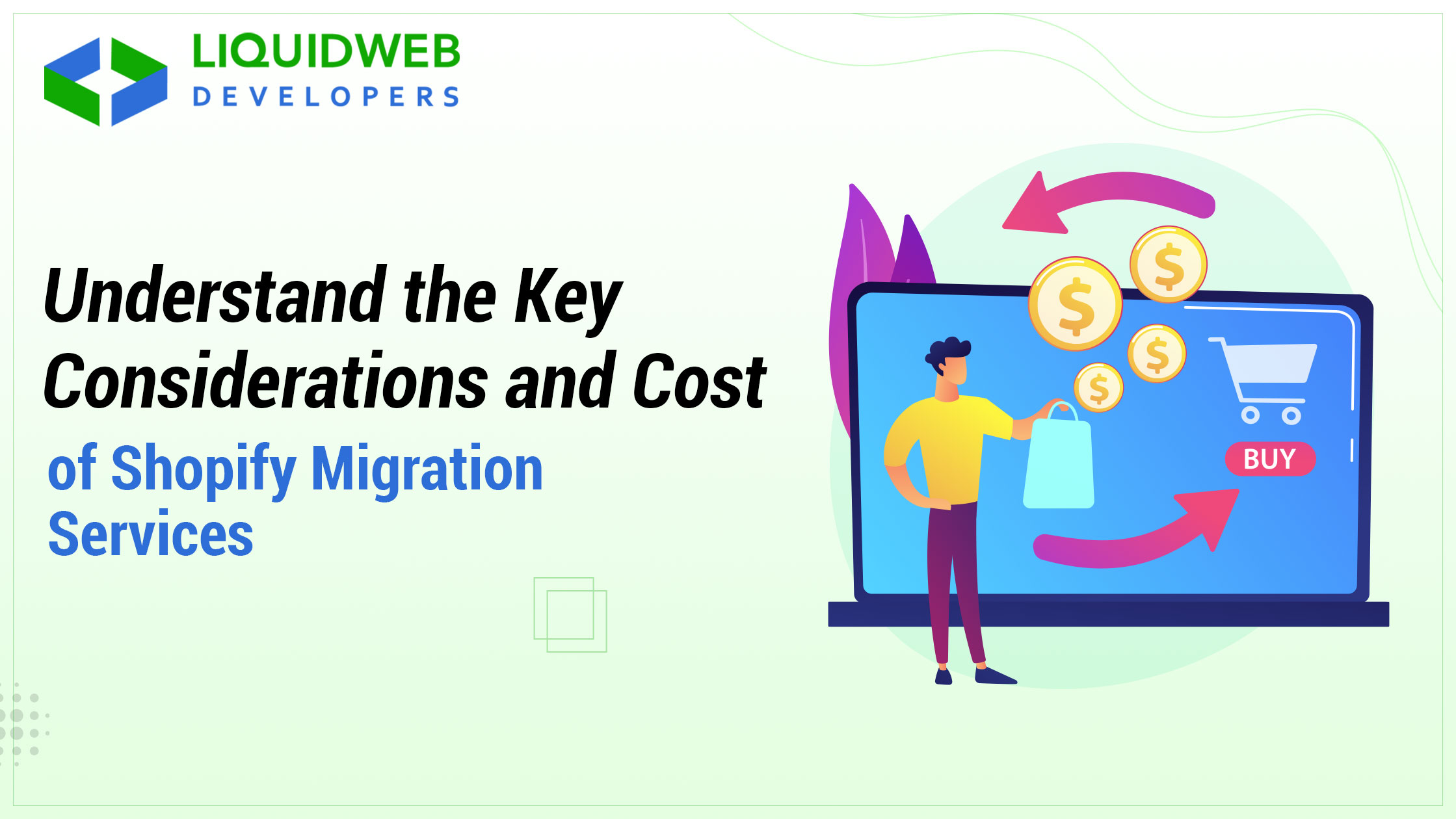Understand the Key Considerations and Cost of Shopify Migration Services

There are numerous motives why a merchant makes a decision to switch to Shopify. Do you want to replace your layout objectives, want greater sophisticated features, or experience that your present eCommerce platform is not imparting sufficient room for boom?
For whatever reason the same question arises in your mind: “What will be the cost of migration?”
You should have your foundation clear if you want to make the switch to Shopify to go smoothly. So, to start, let’s talk about a few common considerations and the cost breakdown for Shopify migration services.
Key Considerations to Make During Shopify Migration Services
Shopify vs. Shopify Plus
The first selection you’ll want to make after finding out to update Shopify is which tier to go along with.
Shopify gives numerous degrees to cater for your requirements, which include Basic, Shopify, Advanced, and many others. Your business goals will determine which plan is fine for you; our e-trade specialists are thrilled to assist in figuring out the maximum appropriate alternative.
Important distinctions between the basic Shopify levels consist of:
number of staff accounts
credit card processing rates
number of store locations
level of reporting available
The distinctions between Shopify Plus and the basic Shopify levels are more pronounced. Shopify Plus is best suited for larger-scale enterprises due to its more potent capabilities, especially if your company needs an integrated wholesale package.
Mobile Optimization
In 2022, mobile gadgets accounted for forty-two. Nine percent of all e-commerce transactions, according to Shopify. This means that having a cellular-pleasant internet site is vital for both the user’s enjoyment and the ability to income in your keep.
Make certain that all of your situation depend on’s elements, along with photographs and content cloth, is cell-first-rate.
Search engine optimization
Increasing the quantity of natural traffic to your website through search engine optimization, or search engine optimization, is essential. If precautions are not taken to lessen the interruption, migrating your website could negatively have an impact on its herbal visitors and ratings.
After the migration is finished, make certain you replace internal hyperlinks, set up redirects, make an academic 404 page, update one-way links where you can, and move slowly through the site for reproduction and broken pages.
Plug-Ins & Apps
There are an amazing number of applications available on Shopify to add more features and functionality to your storefront. You must, however, balance each app’s value addition against its performance and security concerns.
Every plugin and app provides code to your internet site that, depending on the complexity and degree of access granted, might also cause your web page to load slowly or allow the app to keep personal records that you or your customers would prefer to keep personal.
Furthermore, fantastic apps should struggle with each other, giving customers a horrible experience and in all likely hood impairing the overall performance of your net web-site.
How Much Does it Cost to Migrate to Shopify?
Shopify Subscription Fees
Since Shopify offers monthly subscription plans, this is the first expense to take into account when switching to Shopify. The answer to the question of which subscription plan is best for you is that it will depend on the features needed and the size of your organization.
I’ve added a table here that lists Shopify’s price plans along with the sizes of businesses for which they are most effective. You can evaluate the price models of Shopify plans to select the one that best suits the size and budget of your store.
Store Migration Cost
All of your data must be transferred to Shopify, and unless your business contains a very small amount of data, you’ll probably require assistance from a Shopify developer to complete the migration.
The Price Of Hiring A Shopify Migration Expert
$10,000 to $20,000 at a fixed rate
On an hourly basis, between $20 and $55
It’s vital to not forget that those expenses will range based totally on a number of variables, such as your uniqueness, the complexity, and scale of your save, the period of the procedure, and the level of revelry of the Shopify developers you hire. Additionally, you could constantly select what high-quality suits your needs and price range.
You are aware that the transfer of stored data is not the end of the migration procedure. It also entails moving shop functions, which means that your Shopify store has to be completely set up and redesigned.
Shopify Store Setup and Redesign Cost
To get your Shopify journey off to a good start, you’ll want a subject. Additionally, its surroundings carries a number of Shopify apps for additional features.
I’ve included a list of the expenses you might incur when setting up and redesigning your Shopify store below.
Theme Prices on Shopify on Average
Shopify provides its users with free themes. Nevertheless, top class subject matters are also supplied; they regularly run you between $180 and $350. You can recollect hiring a relied on Shopify website improvement offerings organization for better redesigning and optimizing the Shopify shop.
The Average Cost Of Apps On Shopify
For the convenience of users, the Shopify app store provides over 6000 apps, both paid and free. On the Shopify platform, premium apps typically cost around $20 a month.
Expense of Configuring or Redesigning a Shopify Website
Setting up your enterprise will probably require the assistance of a Shopify professional, particularly if you want ideal integration of Shopify issues and apps and remarkable customization. Depending on the developer’s experience and the degree of customization required, the rate will range from $500 to $25,000.
Domain Name Charges
It will cost money to buy a domain name if you want to offer your company a whole new look after the move. This procedure entails getting a new domain name and removing your old one.
And it is the way you come across the annual price of obtaining a brand new area code, which typically runs between $10 and $20. However, the charge ought to move up based on things just like the registrar of choice, the duration of the registration, and extra features.
Takeaway
Because it’s extraordinarily customizable, cost-effective, and flexible, Shopify is the best alternative for platform migration. You should transfer to Shopify if you want simplicity of use, hassle-free customization, and much less reliance on builders.
This blog post has addressed all of your key worries about the “Cost of Shopify Migration Services.” Now if you are interested in taking a step forward to switch to Shopify, then you can consider taking a free consultation from our Shopify website design company experts.
